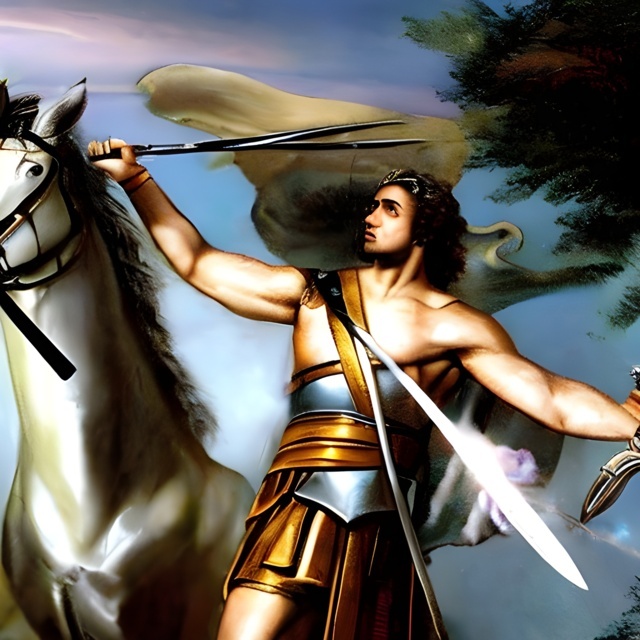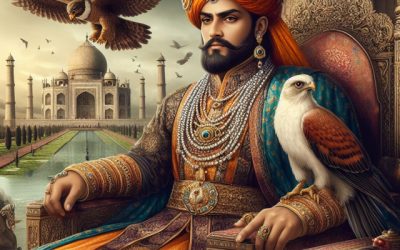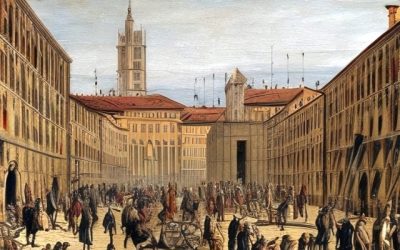Welcome, dear readers, to a journey through the captivating world of Roman literature. Today, we delve into the epic poem known as the Achilleid, penned by the talented Roman poet Statius in the late 1st century AD. Join me as we explore the fascinating tale of the great hero Achilles, his journey, and the unfortunate unfinished masterpiece that is the Achilleid.
A Hero’s Birth and Destiny
Our story unfolds in ancient Greece with the birth of Achilles, a demigod and the son of the sea nymph Thetis and the mortal king Peleus. Prophecies foretold that Achilles would become a renowned warrior, but also that he would meet an untimely death on the battlefield of Troy. The Achilleid captures the essence of this hero’s early life and his fateful destiny.
A Paternal Intervention
Statius weaves his narrative by introducing the character of Achilles’ father, Peleus, who is deeply concerned about his son’s future. Fearing for Achilles’ life, Peleus disguises him as a girl and hides him among the daughters of King Lycomedes on the island of Scyros. Here, Achilles adopts the name Pyrrha and must navigate the challenges of concealing his true nature while being courted by suitors.
Unveiling of Achilles’ Identity
In a twist of fate, the cunning Odysseus arrives on the island of Scyros, seeking Achilles to join the Greeks in their quest against Troy. Odysseus cleverly exposes Achilles’ true identity by presenting an array of weapons, prompting Achilles to instinctively reach for them. Thus, the young hero is unveiled before the world, and his destiny as the greatest warrior of his time is set in motion.
A Hero’s Training and Mentorship
The Achilleid beautifully depicts the training and mentorship of Achilles under the wise guidance of the centaur Chiron. The centaur imparts his vast knowledge of warfare, philosophy, and the arts to the young hero, shaping him into a formidable force on the battlefield. Achilles learns the art of combat, strategy, and the importance of honor, setting the stage for his involvement in the Trojan War.
The Trojan War
The poem touches upon the iconic Trojan War, where Achilles’ heroic deeds and tragic flaws come to the forefront. Achilles’ wrath, ignited by the theft of his concubine Briseis by the Trojan prince Hector, drives him to withdraw from the war. However, the death of his beloved companion Patroclus at the hands of Hector awakens a furious vengeance within him.
Achilles’ Epic Duel
The Achilleid climaxes with the epic duel between Achilles and Hector, where the hero ultimately prevails, fulfilling the prophecy of his invincibility. Yet, this victory comes at a great cost, as Achilles falls victim to his own hubris and anger. The poem concludes with Achilles dragging Hector’s lifeless body behind his chariot, an act that foretells his own tragic demise.
Unfinished Epic
Regrettably, the Achilleid remains an unfinished work, as Statius passed away before its completion. The surviving lines offer us glimpses into the poet’s remarkable talent and his ability to evoke powerful emotions. For instance, Statius writes:
“O goddess-born, whose mother’s lineage brings
A hundred waves to lave her silver feet…”
(Statius, Achilleid, Book I, lines 19-20)
These lines capture the beauty and divine nature of Thetis, Achilles’ mother, as well as his own noble heritage.
Conclusion
The Achilleid stands as a testament to Statius’ literary prowess and his contribution to the rich tapestry of Roman literature. Though unfinished, this epic poem continues to captivate readers with its timeless themes of heroism, fate, and the consequences of unchecked pride. Through vivid storytelling and poignant lines, Statius brings to life the legendary hero Achilles and his journey, leaving us to ponder the grandeur of what might have been.
References
– Statius. Achilleid. Translated by Stanley Lombardo, Hackett Publishing Company, 2018.
– Lovatt, Helen. Statius and Epic Games: Sport, Politics, and Poetics in the Thebaid. Cambridge University Press, 2005.
– Barchiesi, Alessandro. The Poet and the Prince
Tags
Divi Meetup 2019, San Francisco
Related Articles
Unappreciated Greatness
Life and Legacy of Jahangir of the Mughal Empire. Jahangir ruled over one of the largest empires in human history during his lifetime, yet few people outside of South Asia have heard of him. I aim to shed light on the life and legacy of this remarkable figure,...
The Plague Doctor’s Diary
A Personal Account of the Turin Epidemic of 1656. I am writing this diary to record my experiences and observations as a plague doctor in Turin, the capital of the Duchy of Savoy, during the terrible epidemic that has afflicted this city and its surroundings since the...
The Timeless Beauty of Bustan
Unveiling the Secrets of Saadi Shirazi's Masterpiece.In the realm of Persian literature, few works have captured the essence of love, spirituality, and morality quite like Bustan (The Orchard) by Saadi Shirazi. This 13th-century masterpiece has left a lasting impact...
Stay Up to Date With The Latest News & Updates
Explore
Browse your topics of interest using our keyword list.
Join Our Newsletter
Sign-up to get an overview of our recent articles handpicked by our editors.
Follow Us
Follow our social media accounts to get instant notifications about our newly published articles.









